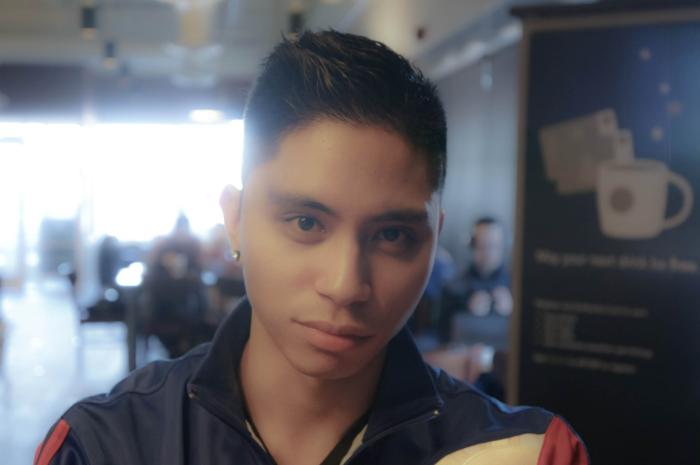
James Beni Wilson says he has no regrets about learning about his real mother from Tabogon. The adopted Fil-Am student plans to show a documentary film about his search.
Filipino-American James Beni Wilson spent most of his 25 years wondering about his real parents.
As an adopted child growing up in Michigan, USA, he was teased by playmates about his brown skin.
“I always thought that I wasn’t wanted as a kid and that was why I was abandoned… In America, there is a stereotype that you are a problem child and that adoptees have negative thoughts about it. I hope my situation will make people rethink,” he said.
His visit last month to Cebu was his second time since he flew here on April 2013 to trace his roots in the northern town of Tabogon.
His discoveries are being made into a short documentary film.
In an interview facilitated by the regional office of Department of Social Welfare and Services (DSWD), James recalled how his desire to find his real parents drove him to search for answers.
“My foster parents are very supportive, though they do not help me in the money aspect because they are American. If you want something, you have to work for it,” James told Cebu Daily News.
“They are supportive in some aspects and I think they understand what it feels like to be an outsider, other kind of person, someone who does not feel he fits in.”
An incoming third year college student majoring in social work in Arizona State University, James worked part-time as a coffee barista in Starbucks where he got a scholarship.
On some days he works in a Subway fast-food outlet, making sandwiches to earn extra money for the trip back to the Philippines.
Documentary
The sting of discrimination marked his childhood.
“I used to have darker skin. I started using whitening lotion because I was told that I looked like a monkey, that my skin was not the same as other kids. When people tell you that, you never forget it,” James said.
James was 18 years old when he was introduced to a Filipino community in Michigan where he took classes about Philippine culture and language.
During that time, he also started reaching out to the Inter-country Adoption Board (ICAB) to start digging up facts which he put together in a short documentary.
It was April 2013 when he flew from Michigan to the Philippines.
He learned that a farmer, Elizabeth Ochea, found him, a newborn, placed inside a plastic bag strung up on a banana tree in a mountain barangay of Mabuli in Tabogon town.
His foster parents gave him news clippings and information about his childhood based on the accounts of social workers.
The case file revealed that he was found covered in fresh blood with his umbilical cord still intact in the morning of Jan. 24, 1990 by Ochea.
“A lady who found me said she heard a baby cry when she was taking care of her carabao. She found me and took me home. She took care of me for three days until word came out. I was taken by the Department of Social Welfare and Development (DSWD) in Tabogon,” James said.
That was how he got his second name “Beni”, a shortened word for “binitay,” the Cebuano word for “hanging.”
The baby was brought to the DSWD regional office where abandonment papers were filed.
Two years later, baby James was transferred to a foster home where he was cared for by Perfecta and Bernardo Torres in Labangon, Cebu City.
He was put up for adoption.
The Wilson couple who hails from Brownstone Detroit, Michigan were able to meet the requirements for adoptive parents and took in the three-year-old James Beni.
The adopted son tried to search for Ochea.
When he arrived in 2013, he was shocked to learn that she was actually his biological mother and that she had passed away a month earlier at age 58 due to liver cirrhosis.
“I wanted to come back when I was 18, but by the time I got here I was already too late. I could have helped her. I was ready to forgive and forget the past and move on,” he said.
James said he visited her grave.
From relatives, he learned that his mother was not supposed to give away her baby if not for certain difficult circumstances, which he asked to remain private.
“What I learned on this trip is that my biological mother gave me a name. She called me Isagani but then I was taken away by DSWD because she told everyone in the barrio a different story,” he said.
“I have no regrets about finding her. My story can also inspire other people.”
During the interview, James introduced his sister Evangeline, whom he was spending quality time with during his second visit to the country last month.
When asked about his plans, Wilson said he wanted to be a teacher on foreign studies.
He said he is preparing to show his documentary “Binitay: A Journey of an Adoptee.”
James works as a camp counselor on Filipino Heritage Camp for Filipino adoptees in Colorado.
Sheba Dabon, a DSWD point person for adoption, said Wilson is one of many beneficiaries of ICAB where foundlings or abandoned kids are matched with international foster parents in partner countries.
“Once a child is available for adoption, he or she will be matched with a family.
If we can’t find compatible parents for the child, we will bring him or her to the international pool of foster parents,” she said.
Disclaimer: The comments uploaded on this site do not necessarily represent or reflect the views of management and owner of Cebudailynews. We reserve the right to exclude comments that we deem to be inconsistent with our editorial standards.
